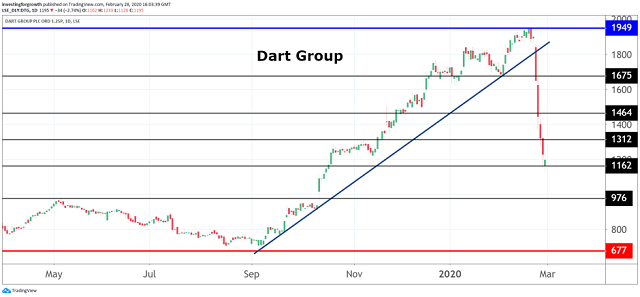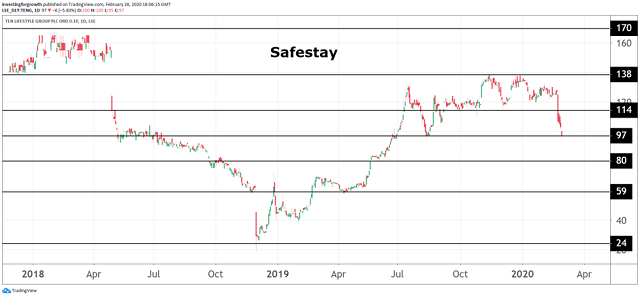Are these five AIM shares a bargain after coronavirus crash?
As markets plunge, our award-winning AIM writer talks performance and possible recovery plays.
28th February 2020 16:21
by Andrew Hore from interactive investor
As markets plunge, our award-winning AIM writer talks performance and possible recovery plays.

It is difficult for companies and investors to assess just what effect coronavirus is going to have over the next few weeks and months, but investors have become far more worried this week. And it is not just companies affected by the virus that are suffering big share price falls. Profit taking is widespread, even among good businesses with no discernible exposure to the virus.
Share prices have dived in the past five days and continue to fall.
Many companies that source their products from China have played down the effect of the virus, so far, because it coincided with Chinese New Year when factories are shut. Whether there will be a greater effect in the coming months is uncertain. Even if sales are not hit, there could be additional costs that hold back profitability.
Both the FTSE 100 and FTSE AIM All Share index are down over 12% in the final week of February, by 900 points and 120 points respectively. The FTSE AIM 100 index, which includes the big international businesses on the junior market, fell by as much as 12.6%.
AIM’s biggest winner of 2020
Clinical diagnostics company Novacyt (LSE:NCYT), which launched a CE-Mark approved coronavirus (COVID-19) test last week, having already produced a test for research use, is the biggest gainer on AIM this year (up over 1,000% so far) – although not this week.
It had the positive effect of investors exercising all warrants – some at prices it could not have imagined it would reach in the next five years - raising around €2.8 million from exercised warrants (net of €158,000 paid to a holder of warrants that had been cancelled when a convertible bond facility was terminated).
- How this AIM stock returned 3,500% so quickly
- Like AIM and small-company shares? Check out ii’s Super 60 recommended funds
- Take control of your retirement planning with our award-winning, low-cost Self-Invested Personal Pension (SIPP)
This cash is much needed by the business and will provide working capital if the demand for the new test does indeed soar – the latest announcement suggests potential is significant.
The company’s £74 million valuation is around six times the revenues of continuing operations and it is no surprise that the share price has fallen back from its high. Reality is likely to return to the valuation over the coming months, particularly as coronavirus is likely to provide a one-off boost, although the share price volatility will probably continue for the time being.
Virus devastates AIM
Only one quarter of AIM share prices are higher than at the start of the year, and February has been a bloodbath. Looking down the worst performers on AIM this year, they are companies that have their own problems unrelated to any macro events and trends. In the past week (to Friday afternoon), there are around 30 AIM companies where the share price has risen.
BNP Paribas senior investment strategist Daniel Morris has compared coronavirus to SARS in terms of its potential effect on stock markets. Markets started to worry about SARS in March 2003, but they had already been weak because of concerns around the Iraq war. He points out that China was not as important to the global economy in 2003, when it was 4% of global GDP compared with 17% currently.
It appears that the number of cases of coronavirus has accelerated faster than the cases of SARS, which was predominantly affecting Hong Kong. In 2003, airlines, luxury goods, hotels and restaurants were hardest hit in the sell-off.
The AIM travel and leisure sector has fallen by 17% this year and by nearly one-quarter this week. In contrast, the basic resources sector, although it has fallen this week, is still ahead of the level at the beginning of the year.
The travel and leisure sector includes restaurants and pubs. The most significantly affected companies are likely to be ones most related to travel. Fewer people travelling will hit volumes and that could have a much greater effect on profit because many of these companies have high fixed costs.
AIM’s worst performers
One of the worst performers on AIM is travel and logistics firm Dart Group (LSE:DTG), which has been a favourite in IHT portfolios, and will have had a big effect on the AIM travel and leisure sector performance.
The share price has fallen by more than one-third in the past week. It is understandable that a company that operates the Jet2 airline and is a tour operator will be hit by virus fears. The track record is strong though.
The share price fall at the time of the SARS outbreak was relatively modest and within months the share price was ahead of its previous level.

Source: TradingView Past performance is not a guide to future performance
Interim revenues were 16% ahead at £2.62 billion, while pre-tax profit improved from £331.7 million to £339.7 million. Dart always makes a second-half loss.
Most importantly, the balance sheet is strong with net cash was £455.2 million at the end of September 2019. The figure is likely to fall in the second half because of seasonality, but it will still be significant.
Daniel Morris points out that airline shares fell sharply during the main SARS outbreak but then rebounded strongly when the market picked up.
Shares in Africa-focused airline FastJet (LSE:FJET) have not moved this week, but they have fallen so far it is not surprising. It already required additional cash and any negative factors outside of its control will make its financial position even more precarious. Negotiations with an investor consortium are continuing, but this is a risky investment even without the coronavirus and a bounce back cannot be counted on at this point.
Travelling south
Another travel-related company is Ten Lifestyle (LSE:TENG), which has fallen by one-fifth. This is different to Dart in that it is losing money, although it was heading towards profitability. It provides a travel and concierge service for clients, including booking restaurants and obtaining tickets for events, from 22 offices around the world.
The services are offered to individuals, but the main business comes from corporates which want to improve customer retention. Two of last year’s major contract wins were with ICBC and CMB in China.
Cash outflow is reducing and there was £12.3 million in the bank at the end of August 2019. Building up critical mass in the global offices is key to moving into profit, but new corporate clients may put off signing up for the time being. Existing clients may also delay increases in contracts. That means that the cash pile may fall further than previously expected, although there appears to be plenty of headroom.

Source: TradingView Past performance is not a guide to future performance
Hostels operator Safestay (LSE:SSTY) has fallen by 20% this week and by more than one-quarter in February. Safestay has 21 hostel sites in the UK and Europe, 18 of which are currently operational, so any limitations in travel will hit the occupancy levels. There is a hostel in Pisa, which is central Italy, so is not one of the main affected areas. A development in Venice is due to open in 2022.
Safestay has been built up by acquisition and some of the newer sites are still building up occupancy levels. That could take longer than expected if the disruption continues for any length of time. Because of the acquisition activity and the refurbishment spending on the buildings net debt, including lease liabilities, is estimated at £36.1 million at the end of 2019 and then £48.2 million at the end of 2020.
Management was optimistic at the beginning of February about the potential for substantial growth this year from a combination of existing sites and recent acquisitions. It also said that there was headroom in its new HSBC facility.
Arena Events (LSE:ARE) recently reported interims showing a return to profit, but the share price has slumped this month and is down by one-fifth this week. The provider of structures and services to international events could be hit by events being cancelled and postponed. It has started to deliver seating for the Tokyo Olympics.
Net debt was £31.5 million at the end of 2019 because of investment in equipment and past acquisitions.
Why AIM is a laggard
One thing to remember is that the performance of AIM shares tends to lag the more-liquid fully listed shares. There tends to be a larger lag when a recovery happens.
This could be a good thing, because if larger company share prices are recovering then it could provide an indicator for picking up shares in AIM companies that have slumped during the period, but have a fundamentally sound business and balance sheet that can cope with short-term problems. Dart is certainly one company to keep an eye on.
Andrew Hore is a freelance contributor and not a direct employee of interactive investor.
These articles are provided for information purposes only. Occasionally, an opinion about whether to buy or sell a specific investment may be provided by third parties. The content is not intended to be a personal recommendation to buy or sell any financial instrument or product, or to adopt any investment strategy as it is not provided based on an assessment of your investing knowledge and experience, your financial situation or your investment objectives. The value of your investments, and the income derived from them, may go down as well as up. You may not get back all the money that you invest. The investments referred to in this article may not be suitable for all investors, and if in doubt, an investor should seek advice from a qualified investment adviser.
Full performance can be found on the company or index summary page on the interactive investor website. Simply click on the company's or index name highlighted in the article.
Disclosure
We use a combination of fundamental and technical analysis in forming our view as to the valuation and prospects of an investment. Where relevant we have set out those particular matters we think are important in the above article, but further detail can be found here.
Please note that our article on this investment should not be considered to be a regular publication.
Details of all recommendations issued by ii during the previous 12-month period can be found here.
ii adheres to a strict code of conduct. Contributors may hold shares or have other interests in companies included in these portfolios, which could create a conflict of interests. Contributors intending to write about any financial instruments in which they have an interest are required to disclose such interest to ii and in the article itself. ii will at all times consider whether such interest impairs the objectivity of the recommendation.
In addition, individuals involved in the production of investment articles are subject to a personal account dealing restriction, which prevents them from placing a transaction in the specified instrument(s) for a period before and for five working days after such publication. This is to avoid personal interests conflicting with the interests of the recipients of those investment articles.